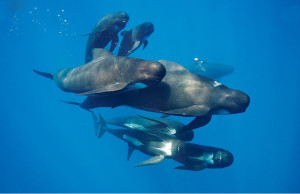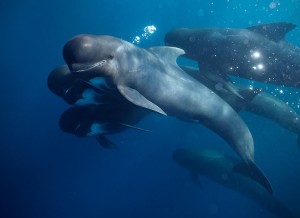Marine Life & Conservation
Sorry, Jo – but I can’t ignore the Grind
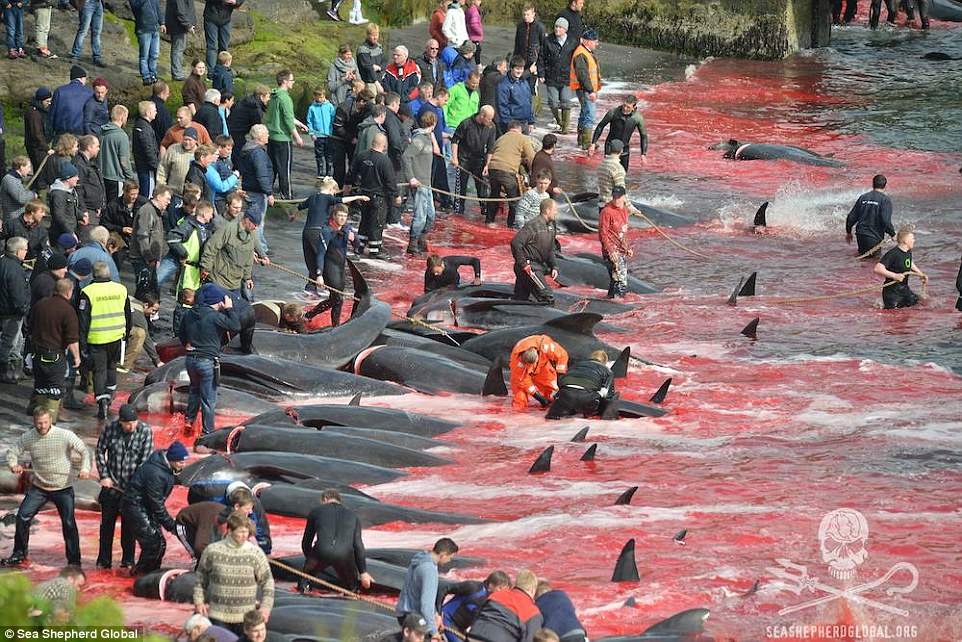
As I opened a copy of Diver magazine’s February 2016 issue it was with great sadness and dismay my eyes fell on an article by Jo Caird entitled ‘Away from the Grind’. The article was based in the Faroe Islands in the North Atlantic and basically recommends we travel to the Faroe Islands, ignore the Grind and go diving.
For those who have never heard of the Grind or are unsure of what it is, let me briefly explain. Wikipedia states that the Grind is ‘Whaling in the Faroe Islands in the North Atlantic and is the hunting and slaughter of mainly long-finned pilot whales when they swim near the islands, and has been practised since about the time of the first Norse settlements on the islands’.
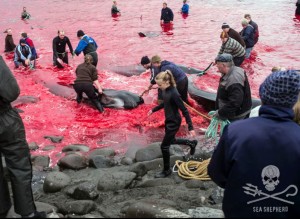 Exact figures of how many Pilot Whales and Dolphins are slaughtered every year are hard to obtain. In 2014 it was over 1,000, in 2015 it was 800. But whatever the figures are it is true to say that every pilot whale that passes the islands is considered good for killing.
Exact figures of how many Pilot Whales and Dolphins are slaughtered every year are hard to obtain. In 2014 it was over 1,000, in 2015 it was 800. But whatever the figures are it is true to say that every pilot whale that passes the islands is considered good for killing.
Cetacean pods and family groups of whales are driven to the shallow waters where they are impaled in the head or blowhole with a large metal hook and then dragged closer to the shore where people saw through the dorsal area to cut the spinal cord. If you are in any doubt about how much stress and pain these animals go through them simply watch one of the many videos on YouTube.
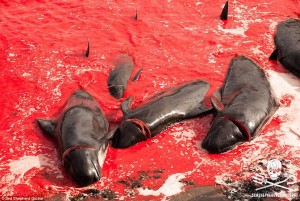 Cetacean family groups, swimming in blood, panic and scream as they watch and wait their turn to be killed. They listen to the death throws of others. We know scientifically that whales feel the same emotions that we do, pain, fear, hunger, happiness, exuberance and more. They are completely sentient.
Cetacean family groups, swimming in blood, panic and scream as they watch and wait their turn to be killed. They listen to the death throws of others. We know scientifically that whales feel the same emotions that we do, pain, fear, hunger, happiness, exuberance and more. They are completely sentient.
Yet Jo Caird asks that we ignore all this just to go diving in a new location and explore the islands. She says that the Grind is a tradition and should be treated as so. Well, beheading, burning, hanging, crucifixion of people all used to be traditional but we have moved on since those barbaric times. Yes it still happens in parts of the world even today, but does that make it right? No of course not.
Cruelty to animals exists in most cultures but that does not make it justifiable. Cruelty in the name of tradition and sport makes it abhorrent.
 In case you are still not sure about the Grind take a look at some of the images on the web from this so called ‘humane and traditional’ social event. Young or old, it makes no difference – all the whales die. Perhaps you can ignore the Grind – I know I can’t.
In case you are still not sure about the Grind take a look at some of the images on the web from this so called ‘humane and traditional’ social event. Young or old, it makes no difference – all the whales die. Perhaps you can ignore the Grind – I know I can’t.
The Faroese claim the whales are a gift from God, but they do not belong to the islanders. The whales annually swim past my Cornish coastline and on up the west coast to Scotland and beyond. Historically we also used to kill whales but times change and the need for this resource has now passed and the brutal killing is no longer necessary.
As for Jo Caird’s article, well it left me cold, and as for the photos that went with it, as far as I could see, there is much better diving to be had here in the UK.
For me as a diver, the seas and marine life are to be shared and marvelled at. The wonder and exhilaration of experiencing communication with any marine species is unique and special. If ancient and bloody traditions such as the Grind continue to get support or are ignored, then we are all responsible for destroying a wonder of evolution as well as systematically destroying an environment that supports much of human life.
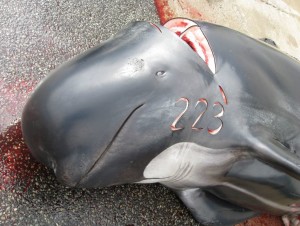 We are often outraged at the loss of man made things such as art or antiquities. A painting of an animal can become so much more valuable than the animal itself. These synthetic things are replaceable, life is not. When the last whale has gone there will never be another.
We are often outraged at the loss of man made things such as art or antiquities. A painting of an animal can become so much more valuable than the animal itself. These synthetic things are replaceable, life is not. When the last whale has gone there will never be another.
If you would still like to visit the Faroes to try the diving, make sure to visit one of the underwater graveyards where the whale remains are dumped. There is a short video on YouTube here.
If you are more interested in seeing whales alive, as in these photos by Chris Walter, then take at look at his site.
Perhaps even book a dive holiday with one of the many tour operators to other parts of the world where you can see them for real.
If you would like to know more about the importance and state of our oceans and our wildlife in general then have a look at the last report from WWF here.
Marine Life & Conservation
Paul Watson Released as Denmark Blocks Japan’s Extradition Bid

Renowned anti-whaling activist Paul Watson has been released from custody in Greenland after spending five months in detention. Denmark’s Justice Ministry rejected Japan’s request for his extradition, citing insufficient guarantees that his time already served in custody would be credited against any potential sentence.
The 74-year-old Canadian-American was arrested on July 21 in Nuuk, Greenland’s capital, when his ship docked to refuel. His arrest was based on a 2012 Japanese warrant related to a 2010 encounter in Antarctic waters. Japan alleged Watson obstructed operations and caused damage to a whaling research ship during efforts to disrupt illegal whaling. Watson has consistently denied these claims, maintaining his commitment to marine conservation.
Denmark, which oversees extradition matters for Greenland, concluded that while the legal conditions for extradition were met, the lack of assurances from Japan regarding time-served credit made extradition untenable.
In a video shared by his foundation, Watson expressed gratitude and relief, saying, “After five months, it’s good to be out… and good to know they’re not sending me to Japan.” He added that the most difficult part of his time in custody was being separated from his two young sons.
Watson is a pioneering figure in marine conservation, known for founding the Captain Paul Watson Foundation in 2022 after decades of activism with the Sea Shepherd Conservation Society. His bold efforts to defend marine life have earned him widespread support, including from celebrities and conservationists. His work has also been featured in the acclaimed reality TV series Whale Wars.
Watson’s lawyer, Jonas Christoffersen, praised the decision, stating, “We are happy and relieved that Paul Watson is now free.” He added that Watson is eager to reunite with his family and continue his vital work.
The arrest occurred while Watson’s vessel, the M/Y John Paul DeJoria, was en route to the North Pacific with a team of 26 volunteers to intercept a Japanese whaling ship. His foundation described the arrest as politically motivated and emphasized that Watson’s actions were focused on ending illegal whaling practices.
Japan resumed commercial whaling in 2019 after leaving the International Whaling Commission, asserting that whale meat is a cultural tradition. Conservationists, however, continue to challenge these practices, highlighting their impact on marine ecosystems.
Despite the challenges, Watson remains steadfast in his mission to protect marine life and bring attention to whaling practices. His dedication to ocean conservation has made him a globally respected advocate for the environment.
Marine Life & Conservation
12 Days of Zero-Waste Fish-mas

This holiday period, the Marine Conservation Society, the UK’s leading ocean membership charity, invites you to make some simple changes to eating fish this Christmas to help our seas.
Dr Kenneth Bodles, Head of Fisheries and Aquaculture at the Marine Conservation Society, said, “During the festive season, our consumption increases, but so does waste. Sustainability isn’t just about where food comes from – it’s also about how you use it. By reducing waste and making the most out of your seafood, you’re not only taking steps to be more ocean-friendly, but can also help to cut costs during what is often one of the most expensive times of the year”.
The Marine Conservation Society has compiled twelve tips on how to consume seafood sustainably with zero-waste this Christmas:
Buy whole fish instead of fillets
Instead of fillets, consider buying whole fish such as salmon, hake, or lemon sole. By adopting a “nose to tail” approach with cooking, whole-baked fish not only feeds a crowd, but also helps to minimise waste and maximise sustainability by using up every part of the animal, including bones, skin, and fat.
Make fish stock
Leftover fish bones or shells can be put to good use by boiling them to make a nourishing fish stock or bisque. This can be frozen and preserved for later use and makes for a flavourful base in a soup.
Make your own fish pâté
Avoid waste by turning leftover fish, such as smoked mackerel or salmon, into a delicious pâté by blending with cream cheese and lemon. Perfect when paired with crackers.
The sustainability of salmon and mackerel varies depending on where and how it is caught or farmed. For more information on green-rated options, check the charity’s Good Fish Guide.
Buy frozen
By purchasing seafood that is frozen or vacuum-packed, this helps to reduce waste by extending the shelf life of your food.
Fish pie
If you’re wondering what to do with leftover cooked fish, why not opt for a classic fish pie with mashed potatoes, leeks, and a cheesy sauce? A sure crowd pleaser on Boxing Day.
Use the head
Don’t forget the fish head! The meat is incredibly tender and flavourful. The charity recommends a cod’s head curry or recreating Fallow’s renowned cod’s head in siracha butter.
By stretching your ingredients further, not only is this a more sustainable way to enjoy seafood, but also cost-effective by repurposing leftovers and cooking creatively.
Boxing Day brunch
Mix leftover kippers or smoked salmon with scrambled eggs for a tasty, zero-waste, Boxing Day brunch.
For best choice, make sure you buy kippers, or herring, from the North Sea and the North Irish Sea.
Zero-waste storage
A top tip from the Marine Conservation Society to avoid waste is freezing fish offcuts to save for future use.
Crisp up the skin
Even leftover fish skin can be turned into a quick savoury snack by crisping it up in an air fryer with a little olive oil and salt.
Anchovies two ways
Leftover anchovies can either be blended with butter to make a delicious anchovy butter or tossed into pasta for a hit of umami flavour.
The charity recommends opting for anchovies caught in the Bay of Biscay for best choice.
Fishcakes
For an easy, zero-waste meal, leftover seafood trimmings can be mixed with mash and fried in breadcrumbs to make fishcakes.
Pickled mussels
Try pickling mussels in 1:1 vinegar and water, with a dash of sugar for a sustainable, zero-waste snack that can be enjoyed well beyond the festive season.
Mussels farmed in the UK are a seafood superhero. Grown using low-impact methods and harvested by hand, they get all the food they need from the sea around them. This makes them one of the most sustainable, ocean-friendly, and cost-effective seafood options.
Players of People’s Postcode Lottery have raised £6.6M towards the Marine Conservation Society’s vital work in making seafood more sustainable.
Laura Chow, Head of Charities at People’s Postcode Lottery, said: “Fish is a festive favourite for many, but making sustainable choices when it comes to how we buy and eat seafood makes all the difference for our ocean. Support from players of People’s Postcode Lottery has helped the Marine Conservation Society further its sustainable seafood work, so that we can all enjoy healthier, better protected seas.”
The Marine Conservation Society encourages you to make sustainable seafood choices a year-round habit, not just for Christmas. To check how sustainable the seafood on your plate is, you can visit the charity’s Good Fish Guide. The Guide helps consumers and businesses identify the most sustainable seafood using a simple traffic light system, based on where and how species are caught or farmed. Green is the best choice, amber means improvements are needed, and red indicates fish to avoid buying.
Zero-waste gift idea
Why not embrace a zero-waste Christmas by gifting a membership to support marine conservation? It’s a meaningful, low-waste gift that helps protect our ocean for generations to come. Memberships start from as little as £5 a month – the price of a sandwich and drink from your local coffee shop.
Find the latest sustainable seafood advice for wild-caught and farmed seafood on the Good Fish Guide, downloadable to your phone from www.mcsuk.org/goodfishguide.
-

 News3 months ago
News3 months agoIconic SS United States to become the World’s Largest Artificial Reef
-

 Blogs2 months ago
Blogs2 months agoScubaverse Christmas Gift Guide 2024: Day 4
-

 News2 months ago
News2 months agoSanta Divers take the Plunge for Charity
-

 Blogs2 months ago
Blogs2 months agoScubaverse Christmas Gift Guide 2024: Day 1
-

 News3 months ago
News3 months agoDiscover Turquoise Divers and Media Luna Beach & Dive Resort: A Premier Diving and Relaxation Destination in Roatan
-

 Blogs2 months ago
Blogs2 months agoScubaverse Christmas Gift Guide 2024: Day 5
-

 Blogs2 months ago
Blogs2 months agoScubaverse Christmas Gift Guide 2024: Day 2
-

 News3 months ago
News3 months agoToucan Diving at Plaza Beach and Dive Resort Bonaire Introduces PADI Mermaid Training



